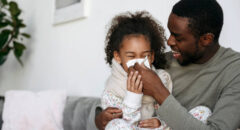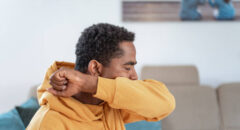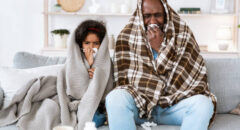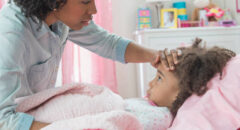
Respiratory syncytial virus (RSV) is a common viral infection that affects people of all ages, with infants and older adults being particularly vulnerable to severe complications.
Preventing the spread of RSV requires a multi-pronged approach that includes vaccination, good hygiene practices and public health initiatives.
You may have seen recent reports about newly approved vaccines for RSV. One vaccine is approved for use between 32 and 36 weeks of pregnancy, to protect infants from birth through six months of age. There are also two RSV vaccines licensed for use in adults aged 60 years and older in the United States.
The U.S. Centers for Disease Control and Prevention recommends that adults 60 and older receive a single dose of RSV vaccine using shared clinical decision-making. This means you and your healthcare provider should have a conversation to decide if RSV vaccination would be beneficial for you.
RSV is a highly contagious virus that targets the respiratory system. While it often causes mild symptoms in healthy individuals, it can lead to more severe respiratory complications, especially in vulnerable people. Infants, particularly those born prematurely, and older adults with weakened immune systems or underlying health conditions are at the greatest risk for severe RSV infections. The consequences of RSV can range from mild respiratory distress to more serious conditions like pneumonia and bronchiolitis, making prevention essential to safeguarding public health.
Vaccination
Vaccinating seniors can help reduce the risk of complications. Encouraging older adults, especially those with underlying health conditions, to get the RSV vaccine can protect individuals from the potentially severe effects of the virus.
RELATED: How Common Are Co-Infections With COVID, Flu, RSV?
Pregnant women
In August, the U.S. Food and Drug Administration approved a vaccine that is administered to pregnant women to protect their babies from RSV through their first six months of life. The single shot spurs the production of protective antibodies that transfer from woman to infant through the placenta. It's the first vaccine that can protect babies from RSV.
Meanwhile, babies will also have a new option to reduce their risk of severe RSV. A new medication called Beyfortus was recently approved for infants younger than eight months who are entering their first RSV season. Some high-risk infants may be eligible for a second shot the following year.
Home interventions
There are additional ways to minimize the spread of RSV with simple hygiene measures in your home.
They include:
- Hand-washing: Frequent and thorough hand-washing with soap and water is a simple, yet effective, measure to prevent the spread of RSV. This practice should be emphasized for both adults and children, particularly after being in public places or in contact with individuals who may be carriers of the virus.
- Sneezing/coughing etiquette: Teaching children and adults to cover their mouth and nose when sneezing or coughing can limit the spread of respiratory droplets containing the virus. Paired with proper disposal of tissues and regular hand-washing, this practice can reduce RSV transmission.
- Don’t get too close: Minimizing close contact with those exhibiting symptoms of respiratory illness is crucial. This is particularly relevant in settings where individuals are at higher risk, such as hospitals, daycare centers and nursing homes.
RELATED: Doctors Answer Your Questions About RSV
Preventing other winter illnesses
RSV is not the only disease that can be tackled with vaccination. Vaccines are also vital tools in preventing both the flu and COVID-19, in addition to pneumonia.
As the flu season approaches, be aware that the flu vaccine is an important tool in preventing serious illness, especially for those with asthma.
People with asthma are more likely to have serious health problems from getting the flu, yet most people with asthma don't receive a flu shot every year.
If you have asthma, you need to take steps to prevent getting the flu. Respiratory infections such as the flu can affect your lungs, causing an asthma attack. The flu vaccine is the first and most important step you can take to protect yourself and your loved ones from this illness.
The American College of Allergy, Asthma and Immunology encourages anyone who may be at risk for a respiratory infection to get a flu vaccine. Health care providers often ask those getting flu shots if they are allergic to eggs. Health care providers and people with egg allergy should know there is no need to ask this question anymore, and no need to take any special precautions. Overwhelming evidence has shown that a flu shot poses no greater risk to those with egg allergy than those without.
Finally, COVID-19 is surging again, and the elderly are particularly at risk. Check with your doctor to see if you are someone who should receive the new COVID boosters that should be available this fall. Protecting yourself against viruses this time of year is an important first step in keeping yourself and those around you healthy.









